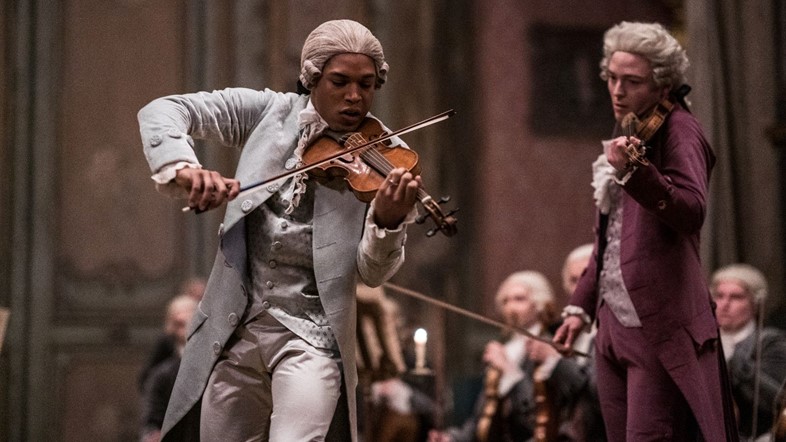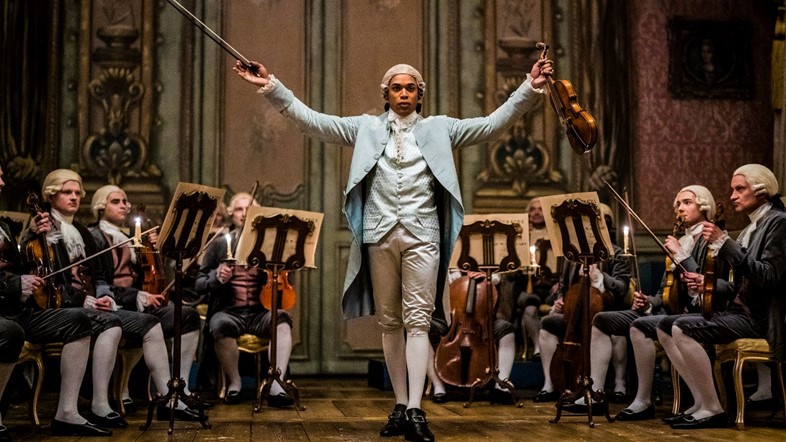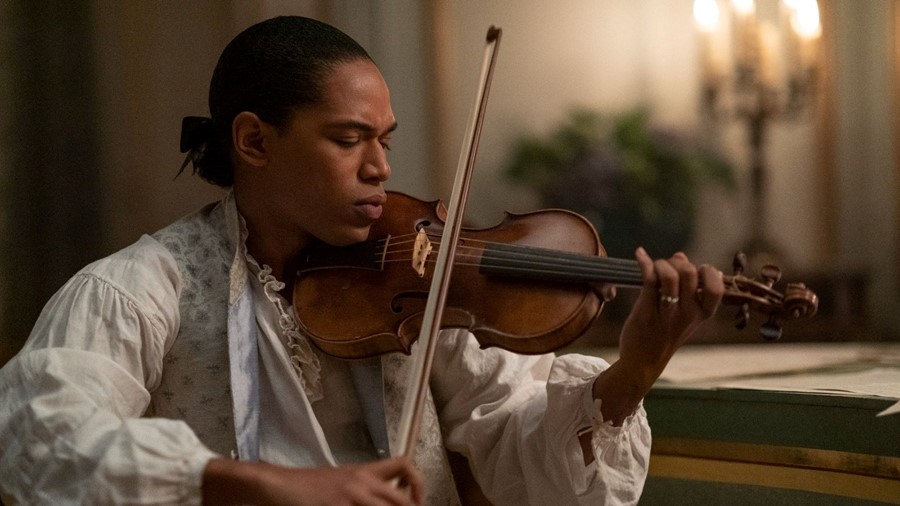As Stephen Williams’ rococo biopic Chevalier is released, Kelvin Harrison Jr talks about playing Joseph Bologne – the most famous composer you’ve never heard of
In 18th-century France, a handful of years before the French Revolution unmakes and remakes the world, a young Black man steps on to a stage. He has nothing in his hands – not even the violin he professes to play – and the crowd is hungry for humiliation. Borrowing an instrument from the orchestra, he faces a scornful rival and puts string to bow. Within minutes, the crowd has stilled. The other man on stage, violin limp in hand, snaps his head round. “Who the fuck,” he snarls, “is that?”
Joseph Bologne may well be the most famous composer you have never heard of. A virtuoso violinist, chevalier in the court of Marie Antoinette, and son of an enslaved Senegalese woman and white plantation owner, the immensity of his life and legacy has long been buried – his compositions destroyed in the wake of Napoleon’s reinstatement of slavery, his name passed over in favour of his more palatable white peers. Now, over 200 years after the drama of his life played out, his story is being brought back into the public sphere in Stephen Williams’ rococo biopic Chevalier, animated by a central performance by Kelvin Harrison Jr whose star – much like the titular chevalier – is only on the up.
There is a particular tangle to playing a person of such extraordinary talent, layers of craft melding into each other. The music of Bologne weaves through both Chevalier and, implicitly, Harrison’s performance, rooting his interpretation in Bologne’s desire for expression against overwhelming odds. This revival of a person so defined by silence could only be done through his music, Harrison explains, through the very language that he inscribed onto the world. “I think we know him to be silenced,” the actor explains, “but Joseph never knew himself to be silenced. It’s not easy to go from the plantation to becoming a chevalier – you have to convince people you deserve to be there, when they’ve made laws saying you never will be.”
Bologne is not the first prodigy that Harrison has played, and he is by no means the last. The young actor’s breakout role was Trey, a talented wrestling student on track to success before a tragedy ruptures his life, in the harrowing 2019 melodrama Waves; he has since played Fred Hampton in The Trial of the Chicago 7, BB King in Elvis, and is set to play Martin Luther King Jr in upcoming TV series Genius: MLK/X and Jean-Michel Basquiat in Julius Onah’s Samo Lives. Sportsmen, artists, musicians: Harrison’s filmography is replete with characters – young, often idealistic Black men – whose staggering potential butts up against a world that often wants them to fail.
“There’s definitely a pattern,” Harrison agrees. “I think I’m drawn to them because I do understand them to an extent.” The son of two musicians (his father helped him train for the role of Bologne), Harrison himself was a child of prodigious talent, proficient in the piano and trumpet from an early age before heading to Hollywood to break into what is still a hostile industry to young people of colour. The roles he picks, or that he is offered, are for him a reflection of the political moment we find ourselves in, of the broader currents of social narrative that determine what stories need to be told. “It’s all our voices that contribute to a movie I make,” he says. “There’s a sense of community: why I’m here as an actor and why the stories I tell [get made] – it means other people feel silenced. Other people feel victimised, other people feel furious. [They’re] trying to find clarity, and I’m part of that community. I’m trying to find clarity too.”

It is a startlingly sensitive position for a famous actor to take, although he politely balks at the suggestion that he has made it – a sign of modesty, perhaps, or an awareness of the ways the industry remains stacked against Black actors. Only 28 and having already starred for the likes of Aaron Sorkin, Joe Wright and Baz Luhrmann, it might have been easy, in some ways, for Harrison to have become untethered from the grimy reality of the world at large. But for the performer, acting is less a signifier of success or glamour than a rhizomatic act of community-making, of articulating a collective experience. “The reality of my life is still very much a Black man in America, a Black man anywhere I go,” he says. “I don’t think these movies would be getting made if there wasn’t a conversation to be had and something to be corrected.”
Nowhere in his career is this more explicit in than in Chevalier, where the legacies of European colonisation sit heavily on Bologne, a direct inheritor of the violence of the transatlantic slave trade. Yet these legacies inform all of Harrison’s projects, period and contemporary: it is a history, he stresses, that is never really left behind. “We all carry the trauma from our past,” he says. “None of us will be able to erase the fact that our ancestors were enslaved. It’s in our bodies and comes out in different ways – that’s why Waves is different from Chevalier, Chevalier is different from the next one. But they’re all connected in some way. We’re all trying to work past it.” Does he ever feel trapped by this inherited trauma? “I need these projects for my experience to get better, I guess,” he says thoughtfully. “Yes, maybe creatively as an actor, would it be nice to do more? I won’t get to do that until these things are addressed. So I’m doing what’s necessary.”
It might be easy for Harrison to get sucked into the subjectivities of these complex characters, to lose sight of himself in the midst of such sweeping stories – not just of people, but of particular and often unending moments of history. But acting, Harrison explains, roots him as much to himself as who he plays, expanding his knowledge of his own identity. The performers he most admires – Tilda Swinton, Cate Blanchett, Isabelle Huppert (“which I know sounds strange, because they’re all white women,” he laughs) – exhibit this same obsession with roles that expose peculiar qualities of the human condition: the contradictions and sharp barbs and soft underbellies that make us who we are. Playing Bologne was a lesson, in many ways, in building a relationship with his own creative process, and the ways in which artistic and self-expression mutually inform each other.

“My art is actually better when I am more myself,” Harrison explains. “Even when you’re playing real people, it’s important that you don’t just play an idea.” It especially struck him, he adds, that Bologne’s only critical success came from the opera (L’Amant Anonyme) he wrote out of a broken heart, rather than the spectacle (Ernestine) he penned in order to achieve fame and acclaim. “People respond to what’s true. I could play Martin Luther King and do the voice and walk like him and look like him. It doesn’t mean anything if there’s no sense of a human being: me, Kelvin, has to also find himself in Martin. That’s real. That’s what I learned from the process. It’s me or nothing.”
It is an incisive comment on the nature of all artistic endeavour – a declaration of the self, from the self, in order to intervene in the collective. “I love it for me, selfishly,” Harrison says of his need to locate himself within his characters, but there is very little selfishness to be found in Chevalier: rather, across his career, Harrison’s roles are defined by a strikingly egoless quality, an urge to articulate something larger than himself. “Art is here to reflect where we are as a society,” he says, shrugging, “and what I do is tell the truth about what human beings look like, either in a past or present moment. And then you get to look at yourself. I cut myself the other day, and I wouldn’t have known it unless I’d looked in the mirror. That’s what we do. It's like, how wounded are you? Is it showing on you and what do you want to do about it?”
Chevalier is out in UK cinemas now.
